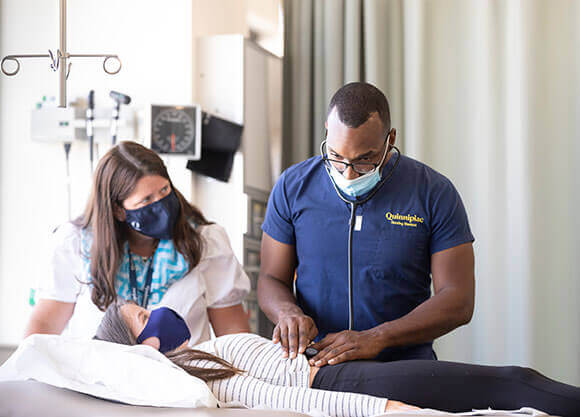The interprofessional curriculum provides you with the flexibility to build an experience that reflects your career goals. You’ll have the option to gain additional certification in one of three tracks: MRI technology, CT scanning and women’s imaging.
In each track, you’ll gain hands-on experience with real patients as well as a diverse range of clinical assignments to develop your skills in diagnostic imaging specialties such as radiology, fluoroscopy and a variety of minimally invasive procedures.
Magnetic Resonance Imaging, or MRI, is a non-invasive diagnostic imaging technique used to visualize detailed internal structures of the body. It employs a powerful magnetic field and radio waves to generate detailed images of organs, tissues and other body structures. MRI is commonly used to diagnose and monitor a wide range of medical conditions, including neurological disorders, musculoskeletal injuries, cardiovascular diseases and cancers.
Specializing in MRI within our MHS in Advanced Medical Imaging and Leadership program enables graduates to pursue careers as MRI technologists or researchers. It provides a solid foundation for those interested in advancing their careers in diagnostic radiology or related healthcare fields.
Computed Tomography (CT), is a diagnostic medical imaging technique that uses X-rays and computer processing to create detailed images of the body. Computed Tomography allows diagnostic imaging professionals to detect and diagnose of various medical conditions. CT scans are commonly used to assess injuries, tumors, infections and other abnormalities in different parts of the body.
By specializing in CT, graduates of the MHS in Advanced Medical Imaging and Leadership program will gain expertise in CT imaging technology, theory and applications. This program is designed for individuals seeking advanced knowledge and skills in the field of medical imaging, with a focus on CT scanning. This track provides a solid foundation for those who aspire to a career in diagnostic radiology, radiation oncology or other healthcare specialties where CT imaging plays a crucial role in patient care.
Women's imaging is a specialized field of radiography focused on the detection, diagnosis and management of breast-related conditions, particularly breast cancer. Mammography, one of the primary modalities used in women's imaging, is a specialized X-ray imaging technique specifically designed to visualize the breast tissue.
Mammography is the most common screening tool used in women's imaging. It involves taking X-ray images (mammograms) of the breast tissue to detect early signs of breast cancer, such as lumps and masses. Mammography can help detect breast cancer at an early stage when it's most treatable.
Women's imaging involves a multidisciplinary approach, with medical imaging professionals working alongside radiologists, surgeons and oncologists to provide comprehensive care to women with breast-related conditions.






